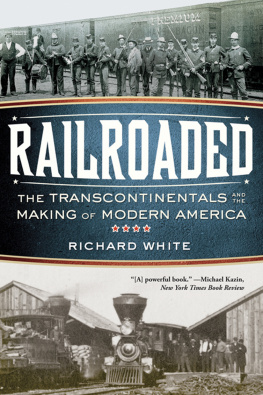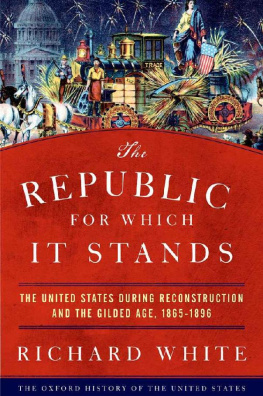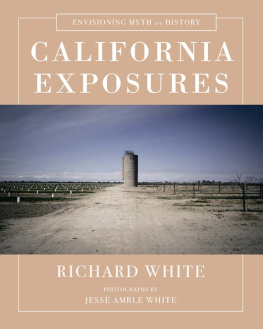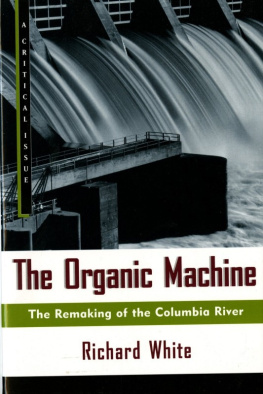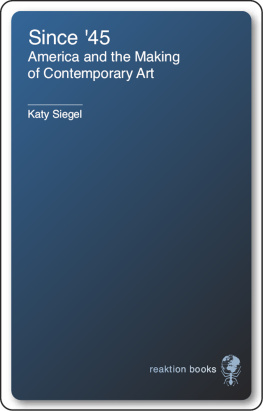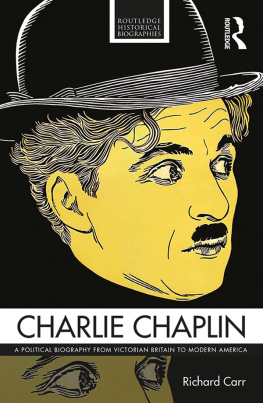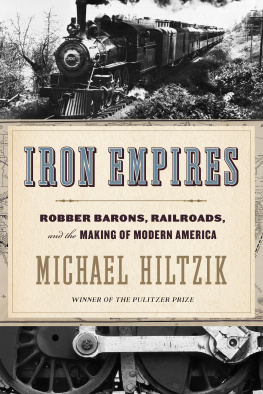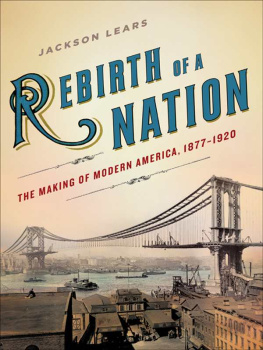More Praise for
RAILROADED
[A] powerful book, crowded with telling details and shrewd observations about nearly every aspect of the world the railroad bosses made.
Michael Kazin, New York Times Book Review
Welcome to a scathing and wonderful new book about American business and its crimes more than one hundred years ago. Richard White, one of our countrys greatest historians, has written a book that will entertain and outrage readers with scenes of corporate greed and mismanagement and the federal bailouts that enabled them. Think of Railroaded as Michael Lewiss Liars Poker , set in a Gilded Age just as fantastically sick as the bond-trading offices of Salomon Brothers in the freshly-deregulated 1980s.
Buzzy Jackson, Boston Globe
Richard White is a Thorstein Veblen for our times. Dripping with venom, this book is nonetheless a model of the historians use of primary sources, narrative skill, and insightful reinterpretation of the Gilded Age. It is easily the best business history I have read, and it carries a weight of argument and evidence that cannot be denied.
Donald Worster, Slate
Railroaded will be required reading for anyone interested in the history of American railroading and the astonishingly swift economic development of the American West that the transcontinentals made possible. This is an exciting story and well told.
John Steele Gordon, Wall Street Journal
A different and provocative view of the role of the transcontinentals in developing the American West. Railroaded will no doubt spark lively debate and become required reading for those seeking an insightful and recast history of the transcontinental railroad saga.
Walter R. Borneman,
San Francisco Chronicle
A fresh and welcome agglomeration of wide-ranging historical detail, including eviscerations of some of the key figuresfrom Jay Gould to Leland Stanfordand an acute analysis that in failure came success and in many ways the map of the nation.
Scott Martelle, Washington Post
White is brilliant in documenting and reconstructing the precise ways in which the Associates and others feasted on the opening the government gave them. [Whites] book is imaginative, iconoclastic, immensely informative and mordantly funny.... [I]t willand shouldchange our views of the role of railroads in transforming America.
Glenn C. Altschuler,
Pittsburgh Post-Gazette
Richard Whites... deeply researched, brilliantly rendered, and irreverent new book... offers a withering critique of how the transcontinentals were built: of their economic proclivities, their financial mismanagement, their political corruption, and their cost to the United States and its people.... The care and the patience with which he has mined the vast record collections, the critical eye and the questions that he has brought into the archives, his refusal to be seduced by the bravado of his main subjects together with the serious attention he accords them, enable White to find and trace the lifeblood of the transcontinentals.... White does a remarkably good job of... helping us understand company organization (more accurately, disorganization), from the financial and managerial operations to the workplaces. White paints very deft portraits of railroad workers at various levels of skill and influence, and of the tensions that emerged among them as well as between them and their bosses. He reminds us, too, of the breathtaking changes the roads demanded in how Americans conceived of time and spaceof what it meant to calculate journeys not in feet and miles, but in hours and minutes or dollars and cents.
Steven Hahn, New Republic
Railroaded , Richard Whites trenchant history of the political economy of the first Gilded Age, told through a close examination of the transcontinental railroad corporations, could not be more timely. Parts of the book read like a Matt Taibbi expos of fraudulent high finance and venal politics, but the bulk of it resembles a Vanity Fair article that gasps even as it sympathizes with insiders divulging the details of how things went terribly wrong. White chronicles the many instances of greed, hubris, incompetence and, in some cases, outright stupidity of the railroad tycoons that culminated in colossal business failures and bloody social clashes. Though there is no shortage of stealing at the top and suffering at the bottom, the story White tells is not about omnipotent robber barons. Instead of recycling Frank Norriss iconic image of a corporate octopus slowly and purposefully strangling states and even whole regions, White describes a group of fat men in an Octopus suit fighting over the controls of a runaway train.... While White tells many horrifying and entertaining stories about corruption and incompetence, his overarching argument is primarily about the fundamental characteristics of capitalism and modernity.
Robin Einhorn, The Nation
Whites portrait of an American government overwhelmed by corruption is breathtaking to behold and devastating to ponder. It alone is reason to read this book.... [White] provides us with the best account I have read of popular efforts in the 1880s and 1890s to free the republic from railroad and corporate rule. Whites recounting of the confrontation between the American Railway Union and the federal government in the Pullman Strike of 1894 is particularly moving. [A] remarkable attempt to resurrect the spirit of the First Gilded Age.
Gary Gerstle, Dissent
In this exhaustively researched and splendidly written book, Richard White takes a thoroughly fresh and strikingly critical new look at the Union Pacific, Central Pacific, and the other steel links laid down after the Civil War.
Elliott West, History Book Club
White is a sharp writer, and he doesnt mince words in judging historical figures.
The Daily
Excellent big-picture, popularly written history of the Howard Zinn mold, backed by a mountain of research and statistics.
Kirkus Reviews , starred review
White reminds us that the railroads didnt just rearrange our sense of space and time but also introduced the idea of large-scale corporate cultureand the attendant greed. American history fans who dont mind some myth busting should enjoy.
Library Journal.com
[An] important and deeply researched history.... White delivers an opin-ionated, delightfully witty but astute account of sleazy Gilded Age politics, business, and journalism, as well as the complex (but uncomfortably familiar) financial maneuvers men used to enrich themselves.
Publishers Weekly
The research and scholarship are first rate.... Mr. White has given us an excellent reference work for the origins of the railroads.
Wes Vernon, Washington Times
Provides a fine, recast history of the transcontinental railroads and their impact on the West, documenting their many massive failures over the usual myths of innovative capitalism and achievement popularized elsewhere.
Midwest Book Review
[This] ambitious book is important reading for all those who care about the major themes at work in the history of the American West.
Jon Lauck, Mitchell Daily Republic
Contending that the transcontinentals were overbuilt money-losers and nodes of labor conflict, White crafts a readable, authoritative study.
Gilbert Taylor , Booklist
There is not a historian in America with a steadier gaze than Richard Whites: with him, no assumption goes unchallenged, no wisdom is ever merely received. Railroaded is a wonderful book: fresh, provocative, witty, filled with foreshadowing of our world but always true to its time, and told with the narrative force of a locomotive roaring across the empty plains.
Geoffrey C. Ward, author of
A First Class Temperament: The Emergence of Franklin Roosevelt
When it comes to the American West, there is no other writer like Richard White, a serious scholar with a highly original take on familiar subjects and wit and elegant prose besides. His subject, the making of the transcontinental railroads, is perhaps the pivotal story of the American West, but its not the one most of us know from movies and mythologies. Its about the birth of all those things that most trouble us nowadays, a genesis story in which the serpent in Eden is the railroad itself writhing across the continent. A story of corporate power, industrialization, and political corruption, White tells it as it needs to be told.
Next page
